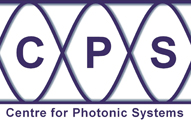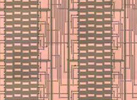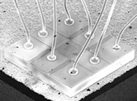| Centre for Photonic Systems Engineering Department Electrical Engineering Division |
 |
 |
 |
 |
 |
| Home | Research | People | Publications | Teaching | CDT | News | Contact |
|---|
|
CURRENT PROJECTS
PREVIOUS PROJECTS |
Photonic Advanced Research and Development for Integrated Generic Manufacturing (PARADIGM) About PARADIGM Project status: Ongoing and ends in 2013 PARADIGM is a 13 million euro project intended to standardize the development and production of optical chips, making them much cheaper and enabling new markets, potentially worth tens of billions of euros. Optical chips are in great demand to process the ever-growing Internet bandwidth requirements, but also have many other application areas such as larger data flows in computers and in processors with dozens of arithmetic cores. In these processing nodes the signal processing still takes place electronically (whereas internet traffic runs via light signals in glass fibers). Those nodes are reaching their limits presenting an opportunity for Optical switches, also known as photonic devices, to provide a solution. At present the bottleneck for large-scale application of optical chips is the price level for the development and manufacture. It is high in comparison with commonplace electronic chips. It is particularly products that are not currently made in large volumes which the project aims to make more than ten times cheaper, as a result of standardization of the design methods and the production techniques involved. Moreover, companies will be able to make prototypes and put products on the market much faster. Smit expects that within six years a large portion of all optical chips can be made in this standardized manner. PARADIGM will also tackle the 'packaging' of the optical chips, facilitating connection with one or more glass fibers. Today that packaging is as expensive as the chips themselves, so it must also become cheaper. PARADIGM technology will enhance the economic viability of these standardized chips still further, so that this technology will become the dominant one for optical chips. Partners Oclaro (UK), Alcatel-Thales III-V Lab (France), HHI and IZM Fraunhofer Institutes (Germany), Philips Miplaza (Netherlands), CIP (UK), Gooch & Housego (UK), Linkra (Italy), Willow Photonics (UK), Cambridge U (UK), Chalmers U (Sweden), Milan U (Italy), (Netherlands), Phoenix (Netherlands), Photon Design (UK), Filarete (Italy), COBRA Institute of Eindhoven University of Technology (Netherlands) |
2020 Centre for Photonic Systems: information provided by webmaster@cps.cam.ac.uk |